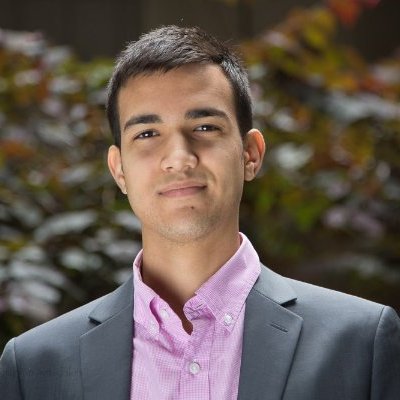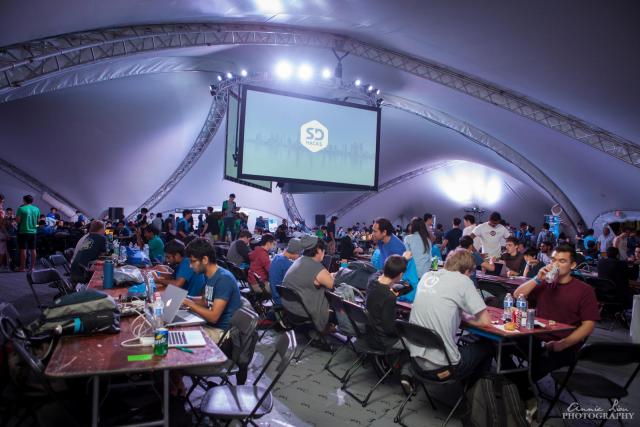
 UC San Diego will host over 1,000 students for 36 hours of technological collaboration at SD Hacks 2016. The second annual hackathon in the series will take place Sept. 30 through Oct. 2 in RIMAC Arena on the UC San Diego campus. The student-led hackathon is one of the largest in California, along with those at UC Berkeley and UCLA. Organizers say that applications are already above the total 3,000 applications to participate in SD Hacks 2015. "We expect to get over 4,000 applications," says CSE junior Yacoub Oulad Daoud (at right), one of the organizers of this year's hackathon.
UC San Diego will host over 1,000 students for 36 hours of technological collaboration at SD Hacks 2016. The second annual hackathon in the series will take place Sept. 30 through Oct. 2 in RIMAC Arena on the UC San Diego campus. The student-led hackathon is one of the largest in California, along with those at UC Berkeley and UCLA. Organizers say that applications are already above the total 3,000 applications to participate in SD Hacks 2015. "We expect to get over 4,000 applications," says CSE junior Yacoub Oulad Daoud (at right), one of the organizers of this year's hackathon.
One of the reasons so many students are drawn to SD Hacks is that companies like Qualcomm, ViaSat, Perkins Coie, SPAWAR and more will be present at the event to look for talent. Students know that San Diego is a dynamic, thriving innovation ecosystem, featuring many of the world’s smartest companies, a talented and loyal workforce, top-tier universities, and easy access to international markets.
 SD Hacks will provide extensive mentorship and resources in order to allow students to learn new skills that they can apply. For instance, the SD Hacks team is collaborating with the campus Virtual Reality Club to plan a workshop and to create a unique space reserved for virtual reality development. The space will feature HTC Vive and Oculus Rift headsets, high-performance computers, and mentors both from the VR Club and NanoVR, a UC San Diego student-led startup.
SD Hacks will provide extensive mentorship and resources in order to allow students to learn new skills that they can apply. For instance, the SD Hacks team is collaborating with the campus Virtual Reality Club to plan a workshop and to create a unique space reserved for virtual reality development. The space will feature HTC Vive and Oculus Rift headsets, high-performance computers, and mentors both from the VR Club and NanoVR, a UC San Diego student-led startup.
“SD Hacks was a fantastic event for ViaSat," observes CSE alumnus Nik Devereaux, who works for ViaSat and serves on the CSE Alumni Board. "We were able to interact with over a thousand engineering students from all over the state.”
SD Hacks 2015 finished with nearly 80 completed projects which competed for prizes in categories for complexity, functionality, innovation and design. The grand prize winners—then-computer science seniors Chris Zelazo (B.S. '16), who is now at Pinterest; Kesav Mulakaluri (B.S. '16), now at Apple; and Chet Lemon (B.S. '16)—created SNS Payments, a mobile application and phone accessory for making wireless payments. Current mobile phone payment systems like Apple Pay require the development of new infrastructure, whereas SNS Payments was able to utilize existing retail equipment.
Organizers of SD Hacks 2016 aim to promote an even higher number of quality projects like SNS Payments at this year's event. The hackathon this year is supported by CSE, the Jacobs School. Rady School of Management, Design Lab (located in the Qualcomm Institute), and UC San Diego Office of Innovation and Commercialization.
Apply to participate in SD Hacks 2016 or volunteer to mentor students.
Want to contribute? Donate online.

